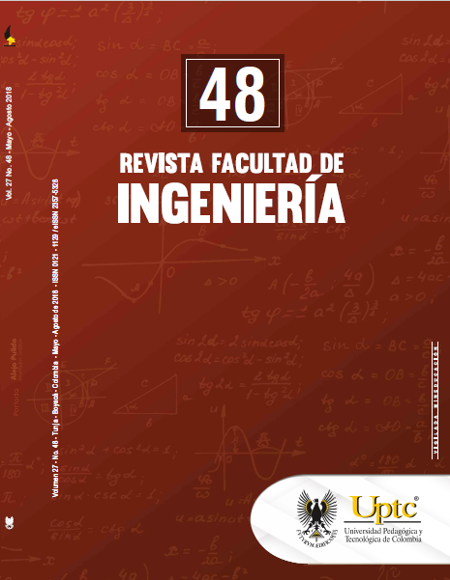Efecto de las capas de enriquecimiento de cobre sobre corrosión localizada en aleaciones aluminio-cobre

Resumen
Fueron desarrolladas capas de enriquecimiento de cobre mediante ataque alcalino en hidróxido de sodio sobre aleaciones aluminio-cobre. Se usaron aleaciones tanto depositadas por pulverización catódica, como vaciadas convencionalmente. Las aleaciones con las capas de enriquecimiento de cobre fueron estudiadas mediante polarización potenciodinámica en una solución de cloruro de sodio, para poder determinar si existe alguna correlación entre las capas de enriquecimiento de cobre y el potencial de picadura de las aleaciones. Los resultados no son concluyentes en el caso de las aleaciones depositadas por pulverización catódica; sin embargo, en el caso de la aleación en condición de vaciado, con el cobre en solución sólida, el potencial de picadura aumenta por la presencia de la capa de enriquecimiento, mostrando además una morfología diferente.
Palabras clave
aleaciones aluminio-cobre, anodizado, enriquecimiento de cobre, potencial de picadura
Citas
- M. K. Cavanaugha, J.-C. Lia, N. Birbilis, and R. G. Buchheit, “Electrochemical Characterization of Intermetallic Phases Common to Aluminum Alloys as a Function of Solution Temperature,” J. Electrochem. Soc., vol. 161, pp. C535-C543, Dec. 2014. DOI: http://doi.org/10.1149/2.0361412jes. DOI: https://doi.org/10.1149/2.0361412jes
- N. Birbilis, and R. G. Buchheit, “Electrochemical Characteristics of Intermetallic Phases in Aluminum Alloys,” J. Electrochem. Soc., vol. 152, pp. B140-B151, Apr. 2015. DOI: http://doi.org/10.1149/1.1869984. DOI: https://doi.org/10.1149/1.1869984
- H. H. Strehblow, and C. J. Doherty, “Examination of aluminum copper films during anodic oxidation,” J. Electrochem. Soc., vol. 125, pp. 30–33, Jan. 1978. DOI: http://doi.org/10.1149/1.2131392. DOI: https://doi.org/10.1149/1.2131392
- M. A. Paez, T. M. Foong, C.T. Ni, G.E. Thompson, K. Shimizu, H. Habazaki, P. Skeldon, and G.C. Wood, “Barrier-type anodic film formation on an Al-3.5 wt% Cu alloy,” Corros. Sci., vol. 38 (1), pp. 59-72, Jan.1996. DOI: https://doi.org/10.1016/0010-938X(96)00102-3
- X. Zhou, H. Habazaki, K. Shimizu, P. Skeldon, G.E. Thompson, and G.C. Wood, “Copper enrichment in Al–Cu alloys due to electropolishing and anodic oxidation,” Thin Solid Films, vol. 293 (1-2), pp. 327–332, Jan. 1997. DOI: http://doi.org/10.1016/S0040-6090(96)09117-1. DOI: https://doi.org/10.1016/S0040-6090(96)09117-1
- Y. Liu, E. A. Sultan, E. V. Koroleva, P. Skeldon, G. E. Thompson, X. Zhou, K. Shimizu, and H. Habazaki, “Grain orientation effects on copper enrichment and oxygen generation during anodizing of an Al-1 at.% Cu alloy,” Corros. Sci., vol 45(4), pp. 789–797, Apr. 2003. DOI: http://doi.org/10.1016/S0010-938X(02)00126-9. DOI: https://doi.org/10.1016/S0010-938X(02)00126-9
- Y. Ma, X. Zhou, G. E. Thompson, M. Curioni, T. Hashimoto, P. Skeldon, P. Thomson, and M. Fowles, “Anodic film formation on AA 2099-T8 aluminium alloy in tartaric-sulphuric acid,” J. Electrochem. Soc., vol. 158 (2), pp. C17–C22, Feb. 2011. DOI: http://doi.org/10.1149/1.3523262. DOI: https://doi.org/10.1149/1.3523262
- R. K. Gupta, N. L. Sukiman, M. K. Cavanaugh, B. R. W. Hinton, C. R. Hutchinson, and N. Birbilis, “Metastable pitting characteristics of aluminium alloys measured using current transients during potentiostatic polarization,” Electrochim. Acta, vol. 66, pp. 245–254. Apr. 2012. DOI: http://doi.org/10.1016/j.electacta.2012.01.090. DOI: https://doi.org/10.1016/j.electacta.2012.01.090
- J. Pierrière, “Rutherford backscattering spectrometry,” Vacuum, vol. 37 (5-6), pp. 429-432, May. 1987. DOI: http://doi.org/10.1016/0042-207X(87)90327-7. DOI: https://doi.org/10.1016/0042-207X(87)90327-7
- L. R. Doolittle, “Algorithms for the rapid simulation of Rutherford backscattering spectra,” Nucl. Instrum. Meth.B, vol. 9(1), pp. 344-351, Jun. 1985. DOI: http://doi.org/10.1016/0168-583X(85)90762-1. DOI: https://doi.org/10.1016/0168-583X(85)90762-1
- G. S. Frankel, J. R. Scully, and C. V. Jahnes, “Repassivation of Pits in Aluminum Thin Films,” J. Electrochem. Soc., vol. 143 (6), pp. 1834-1840, Jun. 1996. DOI: http://doi.org/10.1149/1.1836912. DOI: https://doi.org/10.1149/1.1836912
- J. R. Galvele, “Transport processes in passivity breakdown—II. Full hydrolysis of the metal ions,” Corros. Sci., vol. 21 (8), pp. 551-579, Aug. 1981. DOI: http://doi.org/10.1016/0010-938X(81)90009-3. DOI: https://doi.org/10.1016/0010-938X(81)90009-3
- S. Garcia-Vergara, F. Colin, P. Skeldon, G. E. Thompson, P. Bailey, T. C. Q. Noakes, H. Habazaki, and K. Shimizu, “Effect of Copper Enrichment on the Electrochemical Potential of Binary Al-Cu Alloys,” J. Electrochem. Soc., vol. 151 (1), pp. B16-B21, Jan. 2004. DOI: http://doi.org/10.1149/1.1627343. DOI: https://doi.org/10.1149/1.1627343
- A. Broli, and H. Holtan, “Use of potentiokinetic methods for the determination of characteristic potentials for pitting corrosion of aluminium in a deaerated solution of 3%NaCl,” Corros. Sci., vol. 13(4), pp. 237-246, Apr. 1973. DOI: http://doi.org/10.1016/0010-938X(73)90002-4. DOI: https://doi.org/10.1016/0010-938X(73)90002-4
- G. S. Frankel, “The growth of 2-D pits in thin film aluminium,” Corros. Sci., vol. 30 (12), pp. 1203-1218, Dec. 1990. DOI: http://doi.org/10.1016/0010-938X(90)90199-F. DOI: https://doi.org/10.1016/0010-938X(90)90199-F
- G. S. Frankel, M. A. Russak, C. V. Jahnes, M. Mirzamaani, and V. A. Brusic, “Pitting of Sputtered Aluminum Alloy Thin Films,” J. Electrochem. Soc., vol. 136(4), pp.1243-1244, Apr. 1989. DOI: http://doi.org/10.1149/1.2096864. DOI: https://doi.org/10.1149/1.2096864
- X. Zhou, H. Habazaki, K. Shimizu, P. Skeldon, G. E. Thompson, and G. C. Wood, “Enrichment-dependent anodic oxidation of Zinc in Al-Zn Alloys,” Corros. Sci., vol. 38 (9), pp. 1563-1577, Sep. 1996. DOI: https://doi.org/10.1016/0010-938X(96)00051-0
- G. D. Davis, B. A. Shaw, B. J. Rees, and C. A. Pecile, “Electrochemical behavior and surface chemistry of non‐equilibrium aluminum–tantalum alloys: Solute‐rich interphase mechanisms,” Surf. Int. Anal., vol. 23 (9), pp. 609-617, Aug. 1995. DOI: http://doi.org/10.1002/sia.740230906. DOI: https://doi.org/10.1002/sia.740230906
- G. S. Frankel, R. C. Newman, C. V. Jahnes, and M. A. Russak, “On the Pitting Resistance of Sputter‐Deposited Aluminum Alloys,” J. Electrochem. Soc., vol. 140 (8), pp. 2192-2197, Aug. 1993. DOI: http://doi.org/10.1149/1.2220794. DOI: https://doi.org/10.1149/1.2220794
- M. M. Lohrengel, “Thin anodic oxide layers on aluminium and other valve metals: high field regime,” Mat. Sci. Eng. R, vol. 11(6), pp. 243-294, Dec. 1993. DOI: http://doi.org/10.1016/0927-796X(93)90005-N. DOI: https://doi.org/10.1016/0927-796X(93)90005-N
- X. Zhou, C. Luo, T. Hashimoto, A.E. Hughes, and G.E. Thompson, “Study of localized corrosion in AA2024 aluminium alloy using electron tomography,” Corros. Sci., vol. 58, pp. 299-306, May. 2012. DOI: http://doi.org/10.1016/j.corsci.2012.02.001. DOI: https://doi.org/10.1016/j.corsci.2012.02.001
- X. Zhang, X. Zhou, T. Hashimoto, and B. Liu, “Localized corrosion in AA2024-T351 aluminium alloy: Transition from intergranular corrosion to crystallographic pitting,” Mat. Characterization, vol. 130, pp. 230-236, Aug. 2017. DOI: http://doi.org/10.1016/j.matchar.2017.06.022. DOI: https://doi.org/10.1016/j.matchar.2017.06.022